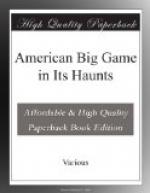In 1889 the President of the United States appointed him member of the Civil Service Commission, where he served until 1895. In 1895 he was appointed one of the Board of Police Commissioners of New York City, and became President of the Board, serving here until 1897. In 1897 he was appointed Assistant Secretary of the Navy, and served for about a year, resigning in 1898 to raise the First United States Volunteer Cavalry. The service done by the regiment—popularly called Roosevelt’s Rough Riders—is sufficiently well known, and Mr. Roosevelt was promoted to a Colonelcy for conspicuous gallantry at the battle of Las Guasimas. At the close of the war with Spain, Mr. Roosevelt became candidate for Governor of New York. He was elected, and served until December 31, 1900. In that year he was elected Vice-President of the United States on the ticket with Mr. McKinley, and on the death of Mr. McKinley, succeeded to the Presidential chair.
Of the Presidents of the United States not a few have been sportsmen, and sportsmen of the best type. The love of Washington for gun and dog, his interest in fisheries, and especially his fondness for horse and hound, in the chase of the red fox, have furnished the theme for many a writer; and recently Mr. Cleveland and Mr. Harrison have been more or less celebrated in the newspapers, Mr. Harrison as a gunner, and Mr. Cleveland for his angling, as well as his duck shooting proclivities.
It is not too much to say, however, that the chair of the chief magistrate has never been occupied by a sportsman whose range of interests was so wide, and so actively manifested, as in the case of Mr. Roosevelt. It is true that Mr. Harrison, Mr. Cleveland, and Mr. McKinley did much in the way of setting aside forest reservations, but chiefly from economic motives; because they believed that the forests should be preserved, both for the timber that they might yield, if wisely exploited, and for their value as storage reservoirs for the waters of our rivers.
The view taken by Mr. Roosevelt is quite different. To him the economics of the case appeal with the same force that they might have for any hard-headed, common sense business American; but beyond this, and perhaps, if the secrets of his heart were known, more than this, Mr. Roosevelt is influenced by a love of nature, which, though considered sentimental by some, is, in fact, nothing more than a far-sightedness, which looks toward the health, happiness, and general well-being of the American race for the future.
As a boy Mr. Roosevelt was fortunate in having a strong love for nature and for outdoor life, and, as in the case of so many boys, this love took the form of an interest in birds, which found its outlet in studying and collecting them. He published, in 1877, a list of the summer birds of the Adirondacks, in Franklin county, New York, and also did more or less collecting of birds on Long Island. The result of all this was the acquiring of some knowledge of the birds of eastern North America, and, what was far more important, a knowledge of how to observe, and an appreciation of the fact that observations, to be of any scientific value, must be definite and precise.




